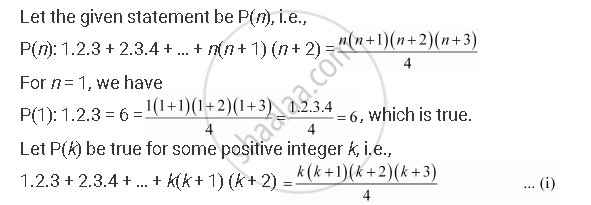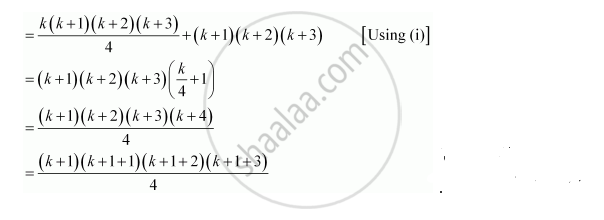Advertisements
Advertisements
प्रश्न
Prove the following by using the principle of mathematical induction for all n ∈ N: 1.2.3 + 2.3.4 + … + n(n + 1) (n + 2) = `(n(n+1)(n+2)(n+3))/(4(n+3))`
उत्तर

We shall now prove that P(k + 1) is true.
Consider
1.2.3 + 2.3.4 + … + k(k + 1) (k + 2) + (k + 1) (k + 2) (k + 3)
= {1.2.3 + 2.3.4 + … + k(k + 1) (k + 2)} + (k + 1) (k + 2) (k + 3)

Thus, P(k + 1) is true whenever P(k) is true.
Hence, by the principle of mathematical induction, statement P(n) is true for all natural numbers i.e., n.
APPEARS IN
संबंधित प्रश्न
Prove the following by using the principle of mathematical induction for all n ∈ N:
`1 + 3 + 3^2 + ... + 3^(n – 1) =((3^n -1))/2`
Prove the following by using the principle of mathematical induction for all n ∈ N:
`1^3 + 2^3 + 3^3 + ... + n^3 = ((n(n+1))/2)^2`
Prove the following by using the principle of mathematical induction for all n ∈ N:
Prove the following by using the principle of mathematical induction for all n ∈ N:
Prove the following by using the principle of mathematical induction for all n ∈ N:
(1+3/1)(1+ 5/4)(1+7/9)...`(1 + ((2n + 1))/n^2) = (n + 1)^2`
Prove the following by using the principle of mathematical induction for all n ∈ N: 102n – 1 + 1 is divisible by 11
Prove the following by using the principle of mathematical induction for all n ∈ N: x2n – y2n is divisible by x + y.
Prove the following by using the principle of mathematical induction for all n ∈ N: 41n – 14n is a multiple of 27.
If P (n) is the statement "n2 − n + 41 is prime", prove that P (1), P (2) and P (3) are true. Prove also that P (41) is not true.
1 + 3 + 32 + ... + 3n−1 = \[\frac{3^n - 1}{2}\]
\[\frac{1}{3 . 5} + \frac{1}{5 . 7} + \frac{1}{7 . 9} + . . . + \frac{1}{(2n + 1)(2n + 3)} = \frac{n}{3(2n + 3)}\]
1.2 + 2.22 + 3.23 + ... + n.2n = (n − 1) 2n+1+2
72n + 23n−3. 3n−1 is divisible by 25 for all n ∈ N.
Given \[a_1 = \frac{1}{2}\left( a_0 + \frac{A}{a_0} \right), a_2 = \frac{1}{2}\left( a_1 + \frac{A}{a_1} \right) \text{ and } a_{n + 1} = \frac{1}{2}\left( a_n + \frac{A}{a_n} \right)\] for n ≥ 2, where a > 0, A > 0.
Prove that \[\frac{a_n - \sqrt{A}}{a_n + \sqrt{A}} = \left( \frac{a_1 - \sqrt{A}}{a_1 + \sqrt{A}} \right) 2^{n - 1}\]
Prove that n3 - 7n + 3 is divisible by 3 for all n \[\in\] N .
\[\text{ Given } a_1 = \frac{1}{2}\left( a_0 + \frac{A}{a_0} \right), a_2 = \frac{1}{2}\left( a_1 + \frac{A}{a_1} \right) \text{ and } a_{n + 1} = \frac{1}{2}\left( a_n + \frac{A}{a_n} \right) \text{ for } n \geq 2, \text{ where } a > 0, A > 0 . \]
\[\text{ Prove that } \frac{a_n - \sqrt{A}}{a_n + \sqrt{A}} = \left( \frac{a_1 - \sqrt{A}}{a_1 + \sqrt{A}} \right) 2^{n - 1} .\]
\[\text{ Let } P\left( n \right) \text{ be the statement } : 2^n \geq 3n . \text{ If } P\left( r \right) \text{ is true, then show that } P\left( r + 1 \right) \text{ is true . Do you conclude that } P\left( n \right)\text{ is true for all n } \in N?\]
\[\text{ A sequence } a_1 , a_2 , a_3 , . . . \text{ is defined by letting } a_1 = 3 \text{ and } a_k = 7 a_{k - 1} \text{ for all natural numbers } k \geq 2 . \text{ Show that } a_n = 3 \cdot 7^{n - 1} \text{ for all } n \in N .\]
\[\text { A sequence } x_1 , x_2 , x_3 , . . . \text{ is defined by letting } x_1 = 2 \text{ and } x_k = \frac{x_{k - 1}}{k} \text{ for all natural numbers } k, k \geq 2 . \text{ Show that } x_n = \frac{2}{n!} \text{ for all } n \in N .\]
\[\text{ A sequence } x_0 , x_1 , x_2 , x_3 , . . . \text{ is defined by letting } x_0 = 5 and x_k = 4 + x_{k - 1}\text{ for all natural number k . } \]
\[\text{ Show that } x_n = 5 + 4n \text{ for all n } \in N \text{ using mathematical induction .} \]
Prove by method of induction, for all n ∈ N:
2 + 4 + 6 + ..... + 2n = n (n+1)
Prove by method of induction, for all n ∈ N:
12 + 32 + 52 + .... + (2n − 1)2 = `"n"/3 (2"n" − 1)(2"n" + 1)`
Prove by method of induction, for all n ∈ N:
1.3 + 3.5 + 5.7 + ..... to n terms = `"n"/3(4"n"^2 + 6"n" - 1)`
Prove by method of induction, for all n ∈ N:
(23n − 1) is divisible by 7
Prove by method of induction, for all n ∈ N:
3n − 2n − 1 is divisible by 4
Answer the following:
Prove, by method of induction, for all n ∈ N
8 + 17 + 26 + … + (9n – 1) = `"n"/2(9"n" + 7)`
Answer the following:
Prove, by method of induction, for all n ∈ N
12 + 42 + 72 + ... + (3n − 2)2 = `"n"/2 (6"n"^2 - 3"n" - 1)`
Answer the following:
Prove by method of induction loga xn = n logax, x > 0, n ∈ N
Let P(n): “2n < (1 × 2 × 3 × ... × n)”. Then the smallest positive integer for which P(n) is true is ______.
Give an example of a statement P(n) which is true for all n. Justify your answer.
Prove the statement by using the Principle of Mathematical Induction:
23n – 1 is divisible by 7, for all natural numbers n.
Prove the statement by using the Principle of Mathematical Induction:
n3 – 7n + 3 is divisible by 3, for all natural numbers n.
Prove the statement by using the Principle of Mathematical Induction:
n(n2 + 5) is divisible by 6, for each natural number n.
Prove that for all n ∈ N.
cos α + cos(α + β) + cos(α + 2β) + ... + cos(α + (n – 1)β) = `(cos(alpha + ((n - 1)/2)beta)sin((nbeta)/2))/(sin beta/2)`.
Prove that, sinθ + sin2θ + sin3θ + ... + sinnθ = `((sin ntheta)/2 sin ((n + 1))/2 theta)/(sin theta/2)`, for all n ∈ N.
Prove that number of subsets of a set containing n distinct elements is 2n, for all n ∈ N.
State whether the following statement is true or false. Justify.
Let P(n) be a statement and let P(k) ⇒ P(k + 1), for some natural number k, then P(n) is true for all n ∈ N.
